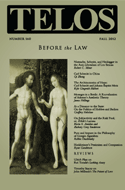Kevin S. Amidon and Zachary Gray Sanderson’s “On Subjectivity and the Risk Pool; or, Žižek’s Lacuna” appears in Telos 160 (Fall 2012). Read the full version online at the Telos Online website, or purchase a print copy of the issue here.
 In his In Defense of Lost Causes, Slavoj Žižek poses more than a few heavy-gauge questions. Foremost among them: “The only true question today is: do we endorse this ‘naturalization’ of capitalism, or does contemporary global capitalism contain antagonisms which are sufficiently strong to prevent its infinite reproduction?” Žižek’s analysis of this question, however, seems to us to be missing a crucial element. Where Žižek seems to posit a kind of reconvergence of the classical autonomous subject of the (neo-)liberal (and Frankfurt School) traditions with the class-based vocabulary of more radical Marxist and Lacanian analyses, we see another layer: the subject under the condition of the risk pool. The risk pool, protean and ubiquitous in today’s political economy, takes form in those meta-structures of institutionalized financial, political, and medical (i.e. bio-political) insurance and quasi-insurance that do not so much control the subject’s spheres of activity as regulate them. The (voluntarily or involuntarily) risk-pooled human being is thus in many ways neither subject nor class. She is always both, and navigating always between them in the sphere of financially and actuarially mediated risk. Such navigation in many ways evacuates the forms of political agency posited in both liberal and Marxist traditions, and focuses the individual centrally on the problem of uncertainty. Žižek’s complex analyses of topics as diverse as terrorism and Christianity approach reflections like these, but end where they must in fact begin.
In his In Defense of Lost Causes, Slavoj Žižek poses more than a few heavy-gauge questions. Foremost among them: “The only true question today is: do we endorse this ‘naturalization’ of capitalism, or does contemporary global capitalism contain antagonisms which are sufficiently strong to prevent its infinite reproduction?” Žižek’s analysis of this question, however, seems to us to be missing a crucial element. Where Žižek seems to posit a kind of reconvergence of the classical autonomous subject of the (neo-)liberal (and Frankfurt School) traditions with the class-based vocabulary of more radical Marxist and Lacanian analyses, we see another layer: the subject under the condition of the risk pool. The risk pool, protean and ubiquitous in today’s political economy, takes form in those meta-structures of institutionalized financial, political, and medical (i.e. bio-political) insurance and quasi-insurance that do not so much control the subject’s spheres of activity as regulate them. The (voluntarily or involuntarily) risk-pooled human being is thus in many ways neither subject nor class. She is always both, and navigating always between them in the sphere of financially and actuarially mediated risk. Such navigation in many ways evacuates the forms of political agency posited in both liberal and Marxist traditions, and focuses the individual centrally on the problem of uncertainty. Žižek’s complex analyses of topics as diverse as terrorism and Christianity approach reflections like these, but end where they must in fact begin.








